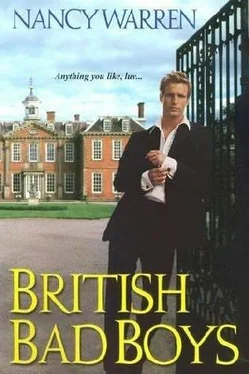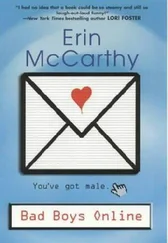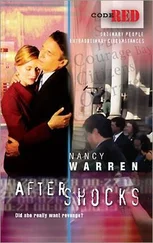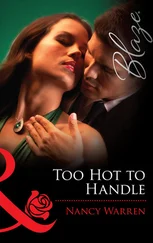The bar itself was a long stretch of ancient, scarred oak that looked far from royal. Tables were scattered on the dark wooden floor as though tossed there. A handful of older men played darts in a corner and an Inglenook fireplace gaped from one end of the big room, a cozy size for roasting an ox in.
A lone bartender was speaking to somebody through a doorway that led, she assumed, to a kitchen, his broad back turned her way. She was no expert on the complexity of the English accent, but he sounded like he was from up north somewhere.
He turned and she caught sight of his face. And felt a rush of recognition flood her. Oh, my God, she thought. I’ve found him.
Uncompromising. That was the first word that sprang to mind when she saw him full on. His jaw was strong, the nose pugnacious, his brow smooth as though he didn’t spend a lot of time with it wrinkled in indecision. His eyes were straight on and clear. For a woman constantly racked with indecision, Meg was immediately drawn to his strength. His eyes were pale, but in this light and from this distance it was impossible to tell the color. Blue maybe, or gray. He looked rough and capable. A working man who could build things with his hands, or use them to defend his village from attack.
“With you in a mo’,” he said, and she nodded.
She stepped closer. While she waited, she continued to gaze about herself. There weren’t many patrons at three o’clock on a Thursday. Apart from the darts players, she noted a couple in the corner lingering over the remains of lunch. An older man in a cap read a newspaper and nursed a beer, and a lone younger man worked on a printed document of some kind.
Stenciled quotations adorned the plaster walls. She couldn’t pass words without reading them.
Work is the curse of the drinking class, Oscar Wilde.
Appropriately, that was stenciled above the dartboard. On the wall over the fireplace was: I drink no more than a sponge, Rabelais.
She spotted another, but it was hard to read because the lighting in that corner was dim. She squinted. Eat, drink, and be merry, for tomorrow we die.
A padded bench was attached to the wall and rectangular tables, perfect for one or two patrons, lined up in front of it. The vision came to her suddenly. A man’s death, there in the corner. She could see it as clearly as though she were witnessing the murder. She stood, entranced, and stared into that corner of dark deeds…
Eat, drink, and be merry, for tomorrow we die…
“Are you all right?” A deep voice pulled her back to the present. Meg realized that the gorgeous bartender was speaking to her, and the way he spoke made her realize he’d addressed her several times before wresting her attention.
“Sorry,” she said, the vision still so strong her fingers itched for a keyboard. “It was the blood.”
His slightly irritated expression vanished. He blinked. Looked past her to where she’d been staring, then back again. “Blood?”
“That table there in the corner. A patron sitting, dead, but no one notices in the din of a Friday night at the pub, not until blood drips.” She nodded. “Yes, that’s it exactly. Not a bullet wound, of course, too noisy. A knife. It must have been a knife.” She raised her hand, mimicking the motion of the murderer’s fisted hand wrapped around the knife hilt, up and under the ribs and then a sudden twist to make sure death was quick and silent enough that no one would notice in a busy pub. The flash of red on her own fingers distracted her for a second until she remembered she’d treated herself to a mani and pedi before setting out on her adventure.
Every writer had her superstitions, her tricks for kick-starting a recalcitrant muse. One of Meg’s-and she’d tried them all recently-was a manicure. There was something about perfectly manicured fingernails dancing across a keyboard that appealed to her. She loved doing a job properly, believed in keeping her tools in good working order. Her brain she fed with good food, books, and poetry. Her writing computer was not hooked up to the Internet, keeping it virus free and unpolluted by promises of a larger penis or a lottery win in Nigeria.
And her hands she pampered because they did the yeoman’s work of writing. She had a special set of exercises to keep them supple and ward off the dreaded carpal tunnel syndrome, she bought wonderful almond-scented hand lotion to keep the skin soft, and she kept her nails polished and buffed, the way a race car driver might polish his car. Her brain was the engine, but it was her hands doing the work.
The pedicure she’d had simply for indulgence. Meg believed in small indulgences. She worked hard, and in the last few years she’d been able to enjoy quite a few of the fruits of her labors, so she could afford a little pampering.
Maybe a lot of pampering.
The dark-haired man behind the bar had given the table she motioned to a quick glance and then transferred his gaze back to her face. He didn’t look at her as though she were a lunatic. He seemed more…intrigued. Up close she noticed the shadow of beard stubble and a single chicken pox scar at the corner of his right eye. Black eyelashes a woman would kill for, eyes that were keen, intelligent.
“What does he look like, the man?”
Meg glanced at the gorgeous bartender-no, she thought they called them publicans here-with approval. Excellent question. She closed her eyes for a moment and then saw him. The victim. “Salt and pepper hair, close cropped. A tiny moustache, kept well-trimmed, discreet. He’s vain, but tidy with it. His clothing is somber but expensive. Yes, expensive.”
“You’ve got the sight then, have you?”
No, she realized now, his accent wasn’t from the north of England but from Ireland. Softened to a slight lilt, she guessed, by years in this country. And that’s where he’d come by the extraordinary combination of that black hair with the blue eyes, for she was close enough now to see that they were a wonderful cross between bright blue and slate gray.
“I have a kind of sight,” she admitted.
“I’m sure there’s many a ghost around here. The pub’s been here half a millennium.”
He could have said five hundred years. But half a millennium sounded so poetic. Especially the way he rolled the words with that soft, deep voice. He was so perfect she wanted to kiss him. She dug into her bag for the paper and pen she carried everywhere. Her hands were tingling with the need to get this down while it was fresh.
“Do you mind if I sit down and take a few notes?”
“Not at all.”
She walked to the table where the murder had happened, sat across from where the victim had enjoyed his last pint. Yes, she thought, a pint of Guinness. No, he was too fussy for that. She suspected he watched his weight.
“What do you call the half-pints of Guinness?” she asked the barman.
“A glass? Do you fancy one?”
“Hmmm?” She glanced at him vaguely, his question intruding on the words she needed to set down. “Oh, no, thank you.” But she couldn’t sit here and have nothing. “But I’d like a pot of tea, please.”
Then she began to write.
And write. When she had the scene down and the heat of inspiration had cooled, she found she’d filled half a dozen pages of her notebook and her hand was pleasantly tired. She flexed her fingers.
She glanced around, realizing that time had passed. The lunch couple were gone, and a few more patrons had arrived. She was aware of a couple of curious glances, but whether they were due to the fact that she was a stranger or because she’d been scribbling madly, she had no idea.
The bartender caught her gaze and walked over.
“You’ve not touched your tea. I’ll fetch you a fresh pot.”
“Oh, thank you,” she said, lifting her head and smiling at him. She hadn’t even noticed the tea. She’d been in her own world, or at least that of the story. She felt dizzy with delight. Six handwritten pages wasn’t much, but it was the first six decent pages she’d managed in months. She wasn’t one to tempt fate, but she began to feel hopeful that her unexpected drought was over.
Читать дальше












